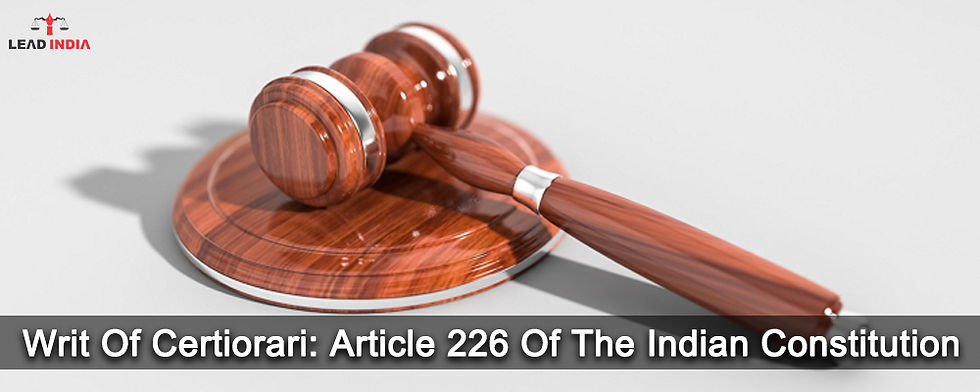Writ Of Certiorari: Article 226 Of The Indian Constitution
- leadindia422
- Sep 18, 2024
- 3 min read
The Writ Of Certiorari, A Prerogative Remedy Under Article 226 Of Coi, Is A Vital Component In Ensuring Justice And Equity. Using This Remedy, The High Courts May Review And Invalidate Decisions Rendered By Subordinate Courts, Tribunals, Or Quasi-Judicial Bodies. The Supreme Court has Established Guidelines For Issuing Writs Of Certiorari Over The Years, Providing A Thorough Framework For The Use Of This
Unusual Authority.
Writ Of Certiorari: History
The Writ Has Its Roots In English Common Law And Was Adopted Into The Indian Legal System As A Safeguard Against Arbitrary And Capricious Administrative Actions. Article 226 Of The Constitution Confers The Power To Issue Writs, Including Certiorari, To High Courts For The Enforcement Of Fundamental Rights And For Any Other Purpose.
Writ Of Certiorari: Its Nature
The Unusual Remedy Known As A Writ Of Certiorari Is Granted At The Discretion Of The Court. The Supreme Court Has Often Stressed That This Writ's Authority Should Be Used With Caution And Infrequently. It Is Not An Appellate Jurisdiction But Rather A Supervisory Jurisdiction To Ensure That The Inferior Courts And Tribunals Act Within Their Jurisdiction And Adhere To The Principles Of Natural Justice.
Issuing Writ Of Certiorari: Grounds
One Of The Primary Grounds For The Issuance Of A Writ Of Certiorari Is The Commission Of An Error Of Jurisdiction. If A Lower Court Or Tribunal Acts Beyond Its Statutory Or Constitutional Authority, The High Court May Intervene To Correct The Error. The Supreme Court Has Made It Clear That A Legitimate Basis For Requesting Certiorari Is An Error That Is Evident On The Face Of The Record And Affects Jurisdiction.
A Violation Of The Principles Of Natural Justice Is Another Crucial Ground For The Issuance Of The Writ. The High Court May Use Its Authority To Overturn A Decision If It Was Made Without Giving A Party A Chance To Be Heard Or If The Audi Alteram Partem Norm Was Broken. The Supreme Court Has Emphasized That Natural Justice Is A Cornerstone Of Fair Administrative Action, And Any Deviation Warrants Judicial Intervention.
The High Court May Step In If There Is A Clear And Obvious Legal Error That Is Evident From The Record, Even Though It Is Hesitant To Meddle With Factual Conclusions. The Supreme Court Has Clarified That The Error Must Be Such That It Goes To The Root Of The Matter And Results In A Miscarriage Of Justice. It's Possible That Merely Misinterpreting The Evidence Or Appreciating The Facts Won't Be Enough To Grant Certiorari.
Discretionary Nature And Alternative Remedies
The Supreme Court Has Consistently Reiterated That The Issuance Of A Writ Of Certiorari Is A Matter Of Discretion For The High Court. The Existence Of An Alternative Remedy Does Not Oust The Jurisdiction Of The High Court To Issue The Writ, But The Court May Consider The Availability Of Alternative Remedies As A Relevant Factor In Exercising Its Discretion.
The Court May Refuse To Entertain A Petition For Certiorari If It Deems That The Petitioner Has An Adequate Alternative Remedy.
The aggrieved Party Must Approach The Court Promptly
Another Important Principle Emphasized By The Supreme Court Is That The Aggrieved Party Must Approach The Court Promptly. Refusing To Provide The Remedy Could Be Justified By A Delay In Requesting The Writ.
The Court May Take Into Account The Concept Of Laches And Refuse To Entertain A Petition If There Is An Unreasonable Delay In Approaching The Court.
Substantive Ultra Vires And Procedural Ultra Vires
In The Context Of Certiorari, The Idea Of Extra Vires, That Is, Going Beyond One's Lawful Power Or Authority, Is Crucial. The Supreme Court Has Recognized Both Substantive Ultra Vires And Procedural Ultra Vires As Grounds For The Issuance Of The Writ.
Substantive Ultra Vires Refer To Violations Of Procedural Rules, Such As Disrespect For The Principles Of Natural Justice, Whereas Substantive Ultra Vires Refer To Actions Or Decisions That Exceed The Authority Granted By Law.
Article 226 Of Coi Provides A Strong Remedy For A writ Of Certiorari, Which Can Be Used To Address Jurisdictional Errors, Natural Justice Violations, And Clear Legal Errors Made By Subordinate Courts, Tribunals, Or Quasi-Judicial Bodies. Through Its Jurisprudence, The Supreme Court Has Clearly Defined The Parameters That Govern The Issuance Of This Exceptional Writ, Highlighting The Remedy's Discretionary Nature, The Importance Of Reasons Such As Jurisdictional Mistake And Breach Of Natural Justice, As Well As The Need For Prompt Redress.
For Any Type Of Legal Assistance, One Can Speak With A Lawyer From Lead India. Lead India Provides Free Online Legal Guidance In India. Along With Receiving Free Legal Advice Online, One Can Also Ask Questions To The Experts Online for Free Through Lead India.
Source:-
Visit us: — www.leadindia.law
Call Us: +91–8800788535
Email: care@leadindia.law
Facebook: — https://www.facebook.com/leadindialaw
LinkedIn: — https://www.linkedin.com/company/76353439
Twitter: — https://twitter.com/leadindialaw
Pinterest: — https://in.pinterest.com/lawleadindia
Instagram: - https://www.instagram.com/leadindialawofficial




Comments